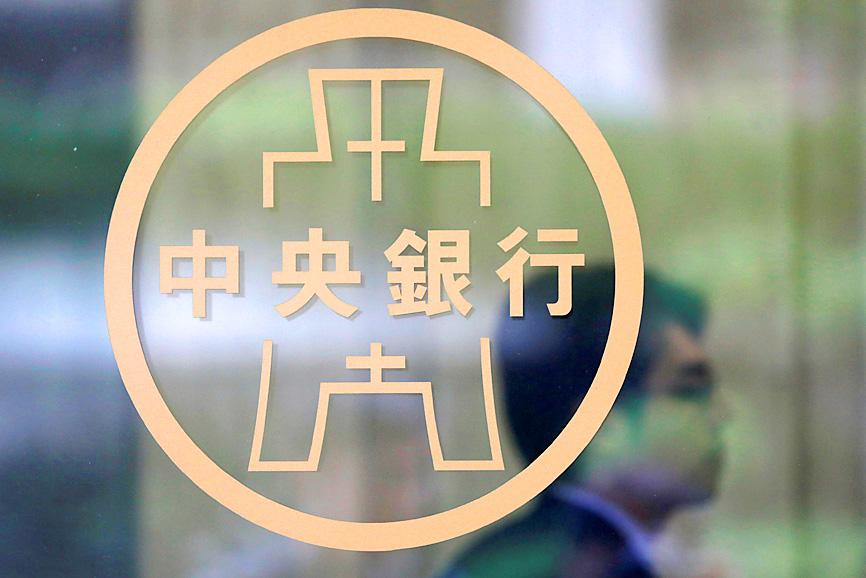If the economic effects of the COVID-19 pandemic are not addressed, they could pose an even greater challenge than those of climate change, the central bank said in a report on Friday.
Calling the pandemic a natural disaster, the report said that while climate change affects economic and financial systems gradually, predictably and over a long term, the pandemic’s effects are immediate, sudden and highly uncertain.
Major economies have adopted large-scale relief and stimulus packages to cope with the fallout of the pandemic, while major central banks have adopted emergency measures such as loosening monetary policies, the report said.

Photo: Tyrone Siu, Reuters
The US Federal Reserve, European Central Bank, Bank of Japan and other major central banks have accelerated their pace of purchasing bonds on a large scale, even faster than in the 2008 global financial crisis, which has led their asset scale to reach record highs, the report said.
As of last month, the Fed’s balance sheet had expanded 73.14 percent to US$7.22 trillion from US$4.17 trillion at the beginning of this year, while the European Central Bank’s balance sheet had grown 46.7 percent from 4.69 trillion euros to 6.88 trillion euros (US$5.76 trillion to US$8.451 trillion), and Bank of Japan’s had risen 23.25 percent from ¥572 trillion to ¥705 trillion (US$5.53 trillion to US$6.81 trillion), the report said.
The three major central banks have also seen the ratios of their bloated balance sheets to GDP rise significantly this year, about three to six times of those before the global financial crisis, it added.
In the face of the central banks’ loose monetary policies, including quantitative easing, emerging economies are inundated with large capital inflows and face severe challenges, such as exchange-rate appreciation, asset bubbles and inflationary pressure, the report said.
Taiwan, as a small, open economy, cannot avoid the spillover effects from these policies, and therefore the greater fluctuations in the exchange rate of the New Taiwan dollar has created a challenge for the nation, it said.
As Taiwan has large excess savings and the government still has some leeway to implement fiscal measures, it should seek to channel abundant capital from the private sector to real investment, while implementing structural reforms in the economy, to boost employment and achieve sustainable growth, the central bank said.
However, the real solution to COVID-19-induced problems depends on whether the virus abates, as well as on the success and widespread utilization of COVID-19 vaccines, it said.
“The central bank hopes that effective vaccines for COVID-19 can be developed as soon as possible, and that vaccinations proceed smoothly, so that the effects of the pandemic can be eased as soon as possible, and loose monetary policies adopted by major central banks can end in an orderly manner, thereby alleviating the worries of financial instability and reducing the spillover effect suffered by small open economies,” the report said.

Sweeping policy changes under US Secretary of Health and Human Services Robert F. Kennedy Jr are having a chilling effect on vaccine makers as anti-vaccine rhetoric has turned into concrete changes in inoculation schedules and recommendations, investors and executives said. The administration of US President Donald Trump has in the past year upended vaccine recommendations, with the country last month ending its longstanding guidance that all children receive inoculations against flu, hepatitis A and other diseases. The unprecedented changes have led to diminished vaccine usage, hurt the investment case for some biotechs, and created a drag that would likely dent revenues and

Macronix International Co (旺宏), the world’s biggest NOR flash memory supplier, yesterday said it would spend NT$22 billion (US$699.1 million) on capacity expansion this year to increase its production of mid-to-low-density memory chips as the world’s major memorychip suppliers are phasing out the market. The company said its planned capital expenditures are about 11 times higher than the NT$1.8 billion it spent on new facilities and equipment last year. A majority of this year’s outlay would be allocated to step up capacity of multi-level cell (MLC) NAND flash memory chips, which are used in embedded multimedia cards (eMMC), a managed

CULPRITS: Factors that affected the slip included falling global crude oil prices, wait-and-see consumer attitudes due to US tariffs and a different Lunar New Year holiday schedule Taiwan’s retail sales ended a nine-year growth streak last year, slipping 0.2 percent from a year earlier as uncertainty over US tariff policies affected demand for durable goods, data released on Friday by the Ministry of Economic Affairs showed. Last year’s retail sales totaled NT$4.84 trillion (US$153.27 billion), down about NT$9.5 billion, or 0.2 percent, from 2024. Despite the decline, the figure was still the second-highest annual sales total on record. Ministry statistics department deputy head Chen Yu-fang (陳玉芳) said sales of cars, motorcycles and related products, which accounted for 17.4 percent of total retail rales last year, fell NT$68.1 billion, or

In the wake of strong global demand for AI applications, Taiwan’s export-oriented economy accelerated with the composite index of economic indicators flashing the first “red” light in December for one year, indicating the economy is in booming mode, the National Development Council (NDC) said yesterday. Moreover, the index of leading indicators, which gauges the potential state of the economy over the next six months, also moved higher in December amid growing optimism over the outlook, the NDC said. In December, the index of economic indicators rose one point from a month earlier to 38, at the lower end of the “red” light.